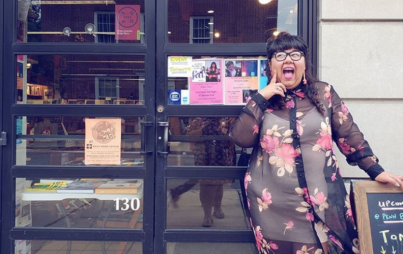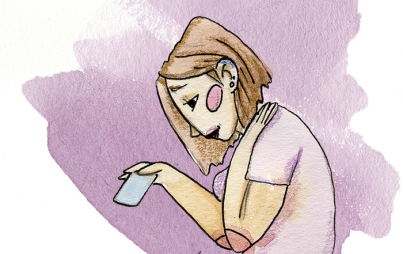
Self-care is vital to establishing a sense of oneself, and creating boundaries from there. (Image Credit: Unsplash/Pavel Badrtvinov)
In simplest terms, codependency is a relationship pattern of losing ourselves in another person and has been called the “disease of the lost self.” More specifically, being codependent involves behavior where there is excessive enabling, controlling, and caretaking within the relationship. It’s worth mentioning here that we all, at one time or another, fall somewhere on the spectrum of codependency.
All my relationships with men had been highly codependent before I realized what was happening and got help for myself. I was attracted to people I could “rescue” or “fix” and people who I thought could “rescue” and take care of me. This, I believe, originated in the false belief that I needed other people to make me happy; and likewise, I was responsible for their happiness and feelings. All of which was born from a low sense of self-worth. This dynamic clouded all of my relationships, but it was extremely severe in my romantic ties.
The help and education I’ve received to change this unhealthy conditioning has saved my sanity and emotional well-being. Here, I outline the 5 steps to quit being codependent and reclaim your life.
1. Get a life.
Your own. I mean it. Learn who you are, what you like, what you dislike. Learn how to fill yourself up. Learn to say no and stop doing things just to please others. Who are you? How do you want to spend your days? What do you want to be able to say by the end of your life? When we are codependent, our identity comes largely from others, so we need to practice knowing ourselves, trusting ourselves. We need to find hobbies that truly light us up from the inside and do things just because it makes us feel good. Don’t look to anyone else for cues on what to feel or how to live. Make up your own damn mind. This will take time— be patient. You are essentially a house under construction and it takes effort and patience to build a strong house.
2. Use boundaries to detach with love.
Trying to control another person through fixing them, manipulating them, or enabling them is essentially living in the problem, since it’s not possible to control another person. To live in the solution, we need to detach from trying to change outcomes for another person and instead let them live their own life, so that we can live our own life. I find this very hard to do when I see suffering and want to “help.” However, I’ve learned that helping can cross over into enabling rather easily. Enabling is when we do something for someone that they can do for themselves and need to do for themselves for their own growth. If we do it for them, we take away their power.
Enabling hinders the other person’s development and even though it looks like helping, it’s harming. So we must get out of the way. Detaching ourselves from their problem is actually the most loving thing we can do. There is a prayer I use: “Grant me the serenity to accept the people I cannot change, the courage to change the one I can, and the wisdom to know that one is me.” The one and only person we can change is our own self.
3. Beware of hooks.
Hooks are common in codependent relationships and you may notice them pop up even more as you try to unhook yourself and the other person senses they are losing control over you. It’s natural for people to dig their hooks in deeper if they feel threatened by a shift in the relationship dynamic. Hooks look like blaming and guilt-tripping and victimhood and martyrdom. Hooks usually involve one person taking zero responsibility for their part and somehow managing to make everything your fault. So the best thing to do here is prepare yourself that it will happen and to practice #3 when it does.
4. Build your self-esteem.
Codependence usually stems from a very low sense of self-esteem. It’s almost as if you’re saying with your actions “I’m not worth it to focus on so I’ll focus on you instead.” When we are stuck in a codependent cycle, we lose what little sense of self we had to begin with. The cure for codependence is then to build our self-esteem. This is no small feat when you have none. So we start where we are and we start small. We build esteem through caring for ourselves, and even if we don’t feel worthy, we act like we are and eventually the belief catches on. We affirm ourselves in the mirror. We take care of our physical self through exercise, eating well, and maintaining personal hygiene. We get dressed and care for our appearance because it helps us to feel good about ourselves.
5. Check-in with your feelings and motives.
One way I know I’m giving from a codependent space is if I haven’t first given to myself. If I’m skipping exercise and my different self-care rituals under the guise of serving another, it’s a red flag to me. I have to serve myself before I serve anyone else. I check-in with how I feel and what I need at all times. I still mess up, but I make continuous progress. I know also that if I’m feeling trapped, helpless, or highly irritable (and not pms’ing) that I’m probably trying to have control over someone or something I have no business trying to control. I check the motives behind my actions. I try to make sure when I give, it’s because I want to and not because I’m afraid to not — that I’m coming from a place of love and not of fear.
I want to make clear that being a caring and loving person who wants to serve others is not a pathological disease. Most codependents are caring and loving people at the heart of everything. We’ve just gotten carried away and more or less lost ourselves as we’ve become “addicted” to another person.
When you’ve crossed the line into codependence, these 5 tips can help you get back on the beam and live your life the way you truly want to.







